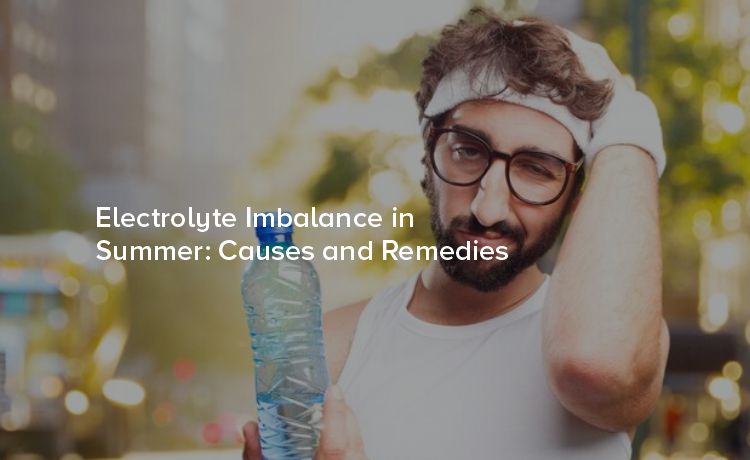
As temperatures soar during the summer months, our bodies undergo several changes to maintain balance and function efficiently. One of the most common health issues that arise during this period is electrolyte imbalance. Electrolytes are vital minerals that help regulate nerve and muscle function, hydration, pH levels, and other critical bodily processes. When these essential minerals are lost through excessive sweating or dehydration, it can lead to an imbalance that affects overall well-being.
Electrolytes are minerals that carry an electric charge and are found in your blood, urine, and other bodily fluids. The major electrolytes include:
These minerals play a key role in maintaining fluid balance, muscle contraction, nerve function, and heart rhythm. When the levels of these electrolytes fluctuate significantly, the body struggles to perform these vital functions properly.
The summer heat poses several challenges for the body, and electrolyte imbalance is one of the most common outcomes. Below are the major summer electrolyte imbalance causes:
During hot and humid weather, your body sweats more to cool down. Sweat contains sodium, potassium, and chloride. When you lose too much sweat without replenishing these minerals, electrolyte levels drop, leading to dehydration and imbalance.
In summer, dehydration occurs rapidly due to high temperatures and outdoor activities. When you lose more water than you take in, it affects the concentration of electrolytes in your blood, disrupting normal body functions.
Athletes, outdoor workers, and fitness enthusiasts often lose significant amounts of electrolytes through sweat. Without proper hydration and electrolyte replacement, fatigue, cramps, and dizziness may set in.
Many people tend to skip meals, consume processed foods, or drink sugary sodas during summer. These choices not only lack essential minerals but can also increase water loss, worsening electrolyte imbalance.
Diarrhea, vomiting, or certain medications like diuretics can lead to rapid electrolyte depletion. Such conditions are particularly dangerous in summer when dehydration risk is already high.
Recognizing the signs of electrolyte imbalance in summer early can help you prevent complications. Symptoms can range from mild discomfort to severe health risks depending on the severity of the imbalance.
One of the most common signs of electrolyte loss is muscle cramps. Low potassium or sodium levels can cause involuntary muscle contractions, pain, or weakness.
When electrolytes like sodium and potassium drop, your body’s energy production and nerve signaling slow down, leading to tiredness, lightheadedness, or fainting.
Dehydration and low sodium levels can trigger headaches or migraines, especially during prolonged exposure to heat.
Electrolytes such as potassium, calcium, and magnesium help regulate heart rhythm. An imbalance can lead to irregular heartbeat or palpitations.
Disturbances in electrolyte levels can affect digestion and cause nausea, vomiting, or stomach upset, further worsening dehydration.
Low sodium (hyponatremia) can affect brain function, leading to confusion, irritability, or even seizures in extreme cases.
Persistent thirst, dry tongue, and reduced urine output are early indicators of dehydration and electrolyte imbalance.
Managing electrolytes is essential for maintaining health during the hot season. Here are practical ways to restore and maintain balance:
Water is the simplest and most effective way to maintain fluid balance. However, plain water alone may not replace lost electrolytes during excessive sweating. Consider alternating between water and oral rehydration solutions (ORS) or electrolyte-infused drinks.
Include natural sources of electrolytes in your diet:
If you’re involved in heavy outdoor activities, sports, or live in extremely hot climates, electrolyte powders or tablets can help. Choose low-sugar options that contain sodium, potassium, and magnesium.
Caffeine and alcohol are diuretics that promote fluid loss. Limit their intake, especially during peak summer hours, to prevent dehydration.
Wear light, breathable fabrics that allow sweat to evaporate efficiently, preventing overheating and excessive fluid loss.
If you work outdoors, schedule regular breaks in shaded or cool areas. This helps your body regulate temperature and conserve fluids.
Post-workout recovery is crucial. Drink water mixed with a pinch of salt and sugar or a natural electrolyte drink like coconut water to restore lost minerals.
In addition to hydration and diet, these simple home remedies can help restore electrolyte balance:
While mild electrolyte imbalance can be corrected through fluids and diet, severe symptoms require medical attention. Visit a healthcare professional if you experience:
Doctors may recommend intravenous (IV) electrolyte replacement or other treatments depending on the severity of the imbalance.
Electrolyte imbalance in summer is a common yet preventable issue. The key lies in maintaining adequate hydration and replenishing lost minerals through diet and lifestyle adjustments. Understanding the summer electrolyte imbalance causes and identifying the signs of electrolyte imbalance in summer early can help you take proactive steps to stay healthy and energetic.
With simple preventive measures—like drinking enough fluids, consuming electrolyte-rich foods, and staying cool—you can enjoy a safe and refreshing summer without dehydration or fatigue.